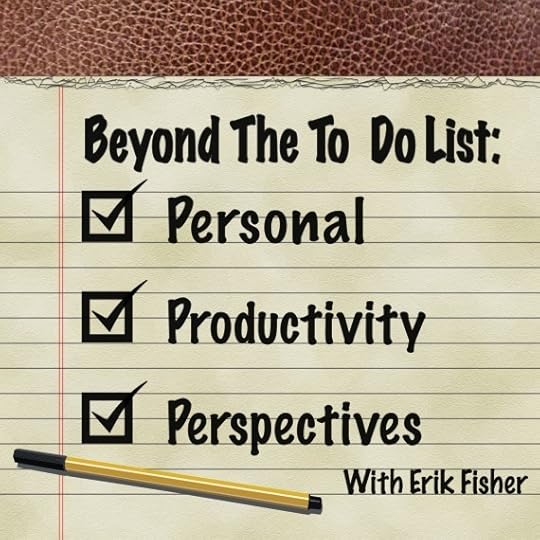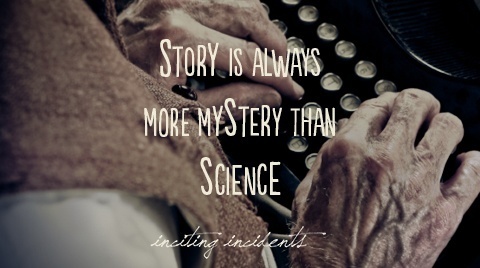Jeff Goins's Blog, page 89
October 4, 2012
What It Really Takes to Get Published: An Interview with Michael Hyatt
I recently had a conversation with my friend, Michael Hyatt, about what it takes to get published. (Yes, I know. That sounds crazy to me, too, but for some reason he keeps taking my calls.)
In the interview, I asked Michael to ditch the industry jargon and speak plainly about how you can publish a book. And he did just that. Below is the interview and some of the highlights (all the quotes are from Michael).

Photo credit: Kristin Nador (Creative Commons)
Listen to the interview
Download: Michael Hyatt Get Published.mp3
About Michael
If you don’t know Michael Hyatt, you should. He is the go-to expert on publishing and platform-building. He even wrote a book on the subject.
Mike is also the chairman of a large publishing house, a New York Times best-selling author, and one of the most popular bloggers in the world. He’s a pretty nice guy and a super helpful person to follow (I’m often getting ideas from his blog).
But before we get into all that, let’s answer an important question…
Why should you get published?
There’s nothing in our culture that credentials you quite like a published book.
In the age of self-publishing and DIY everything, choosing to go with a traditional publisher is no longer the norm. In fact, some people wonder if it’s even worth it, which is a valid concern.
So why bother with a traditionally published book?
It gives you authority and helps you be perceived as an expert on a given subject. There’s no better way to do that than to become an author. Not even an advanced degree can do what publishing a book can do.
So if that’s your goal, or if that idea interests you in some way, how do you get started? Here are three actions you need to take:
1. Change your mindset
It’s more important to have the right mindset than it is to have the talent.
Before you publish anything, you need to have the right attitude. It’s not just enough to have a great story or idea you want to share; you have to believe you can actually do it. It’s a matter of confidence, and believe it or not: your mindset matters.
According to Michael, you need to switch from thinking, “I’ve got to write this book” to, “I get to write this book.” It’s a privilege, something you’re called to do. And you should treat it like one.
Moreover, you need to take ownership of the whole process: your attitude, your actions, and even the results. Of course, you can’t control everything, but this kind of self-accountability will get off the blame train and on the right track.
2. Build a platform
If you have a platform, it creates enormous freedom.
You probably knew this already, but if you want publishers to notice you, you need a platform. A place to gather your tribe of fans and who will follow your lead and want to hear what you have to say.
It’s not easy to do, but there’s nothing like it. Once you have a platform, you have what everyone wants: the attention of an audience. And once you have that, you can do whatever you want.
This is important for fiction and nonfiction authors alike (despite what you’ve heard). And yes, this applies to novelists and memoirists as well as business advice and how-to writers.
And just how do you build a platform? Good question. You figure it out. One step at a time. It’s that simple (but not necessarily easy).
3. Get started
The path unfolds as I take the steps.
What’s the first big step to getting published? Act. Put one foot in front of the other — and repeat. Courage, as we’ve often heard, is not the absence of fear, but the willingness to move in spite of it.
Are you uncomfortable? Nervous? Afraid? Good. Those feelings are good indicators that you need to be moving forward. Getting started can be as simple as starting a blog, declaring yourself a writer, or finally filling out that book proposal.
Whatever it is, you probably already know what it is. So… it’s time to move. And if you’re a little bit afraid, that’s okay. It’s a good sign, because it means there’s something at stake and that you need to get started.
You’ve got something that needs to be shared with the world.
Check out the rest of the interview
In the audio interview, we also talk about:
When you know it’s time to write a book
Whether or not you should self-publish or go with a traditional publisher
Michael’s story of getting rejected 29 times before his first book was published
What it takes for fiction authors to build a platform
How many “fans” you need to get published
The business of publishing and why it matters
Tweetable quotes
“There’s nothing in our culture that credentials you quite like a published book.” (Tweet that)
“If you have a platform, it creates enormous freedom.” (Tweet that)
“You’ve got something that needs to be shared with the world.” (Tweet that)
“If you think you can’t, you’re already defeated from the start.” (Tweet that)
If you could publish a book, what would it be about? Share in the comments.
Special Offer: Michael is giving a special $200 discount off his 21-part audio course, Get Published, for any readers of my blog. If this interview resonated with you, you should check it out.
Disclosure: The above link is an affiliate link, which means I get a commission if you decide to purchase the program. But this is at no extra cost to you. Also, I only endorse products that I use myself and believe in.

October 2, 2012
Six Reasons to Wreck Your Life for Good
Life is often complicated and unpredictable; it’s impossible to control. But of course, that doesn’t stop us from trying. What we need, though, is less smooth sailing and more hardship.
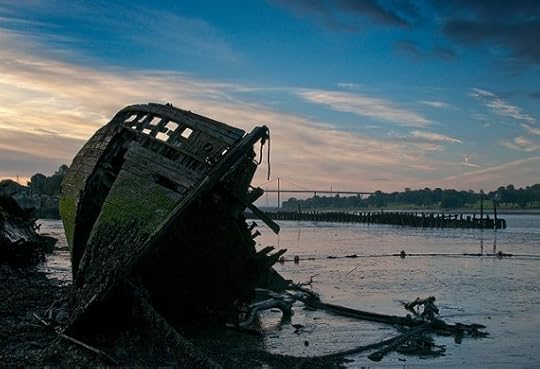
Photo credit: baaker2009 (Creative Commons)
Maybe fulfillment doesn’t come with trying to tame the wild parts of life. Maybe our tidy tales need to get a little unraveled in order to find a larger story. Maybe we need to learn to live more in the tension between what is and what should be.
This is why getting your life wrecked can a good thing. In fact, it’s the best way to find your life’s purpose.
After all, you can’t change your life by sitting on the couch. (You might want to tweet that.) Something drastic has to happen. Maybe something painful or dangerous or even scary. One thing’s for sure: it will be hard.
This is the only way we grow: by stepping into situations that make us uncomfortable. That test our resolve and strengthen our faith. Here are six reasons we need these experiences:
Because life is not about you. The worst way to be happy is to try to be happy; the best way is to help others find their purpose.
Because we long to be part of a bigger story. Admit it: a life that’s all about you and your comfort feels wrong. Trust that feeling.
Because adventure without sacrifice is ultimately unfulfilling. Leaving a legacy isn’t just about having awesome stories; it’s about sacrifice and service. Learning to lay your life down for someone else is how we find our purpose.
Because the most dangerous place to be is on the couch. All it takes for evil to prevail in the world is for good people to do nothing.
Because if you don’t act, maybe no one will. Sometimes, the person we’re all waiting on to do the right thing… is you.
Because comfortable isn’t enough. A nice house and paycheck and comfortable existence can be a little boring; what we need is pain and danger and hardship. That’s where we grow, whether we like it or not.
We all know this. That we need to have our worlds turned upside down. That we need to exchange our smaller stories for larger epics. And still, we resist. We stall.
And all the while the abundant life passes us by.
Isn’t it time you did something different, something uncomfortable? Share what that looks like for you in the comments.
Note: If this resonates, you might want to check out my book, Wrecked. This week only, it’s on sale for $2.99 in eBook format. Get it on Amazon, Barnes & Noble, or CBD. Also, the audiobook is now available.

October 1, 2012
Live First, Write Second
My wife’s first year as a full-time writer almost killed her.
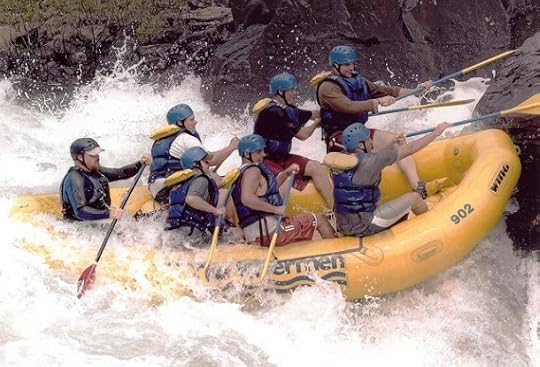
Photo credit: James McCauley (Creative Commons)
It was 2010. We had just moved back to the U.S. after years in Nicaragua, China, and South Africa. I got a job as the Social Media Czar for InterVarsity and the Urbana Missions Conference. And Chrissy had just released her book.
She was studying for the GRE in order to apply for a Ph.D program, but the bulk of Chrissy’s time was spent writing and book-promoting. She blogged, wrote with me for RELEVANT Magazine, sent out query letters, scribbled down new project ideas, and ate too many Oreos.
This was different from life overseas
When we lived overseas, we drew writing ideas from the overflow of adventures that fell into our path:
riding motorcycles across southern Africa
eating pig blood soup
trying to explain the difference between Santa and Jesus to Chinese colleagues
giggling across Caribbean waves and living off free mangos and coconuts
Overseas, we had conflict, adventure, cultural issues, and fun — all fodder for good writing. And now we were “just Americans.” This U.S. culture still felt strange and fresh, and we saw more than ever the need to write about it.
We wanted our writing to offer brilliant advice about living faithfully and well as ordinary North Americans. But it’s hard to write what you aren’t living. (You might want to tweet that.)
A life worth writing about
Writing had always been a side job that flowed out of living, the frosting on the cake of life. Now there was no cake, and Chrissy was gagging on the frosting.
There are genres that don’t need writers to live first and write second — academics and certain technical writing come to mind. But for anything involving people — and our writing sure did — you need some fresh experience undergirding your words.
For us, back in Madison, Wisconsin, it all came apart. One night Chrissy shouted at me while she whacking our dishwasher with a butcher knife:
I would love to do something meaningful and write about it. Writing is supposed to unfold as we live, but right now nothing is unfolding! Life is stuck. We’re stuck. I hate it!
We couldn’t write because we weren’t really living.
We were stuck in the middle of the middle-class. We went from adventure being ordinary in our life to needing to find adventure in our ordinary lives, as ordinary people in an ordinary place.
If we didn’t find it — and fast — our writing careers (and maybe mental health and marriage) would be over. So we returned to a strategy that figured prominently from our dating relationship on into our marriage.
“Amazing Days”
When we first met and started dating, we both relished the challenge of finding something amazing in each day. It could be fun, crazy, silly, faith-filled, or simply good.
Sometimes, Amazing Days were simply not taking something for granted.
It was about noticing. Enjoyed the sunrise? Amazing. Taught a kid to ride a bike? Amazing. Cooked a new food? Amazing. Smiled at a stranger on the sidewalk? A-mazing (and maybe a little creepy).
Sometimes, Amazing Days were more intense.
Boarding a plane for Nicaragua with no idea what awaited us thousands of miles away was certainly amazing. Hearing the story of someone who had been persecuted for her faith was, too. Going for a run in the snow also qualifies as an Amazing Day in our book.
So we decided to start living Amazing Days again, right here in the good ol’ U.S. of A. And you know what? Our writing was better for it. But you know what else? So were our lives.
What this looks like, practically
We’re not perfect, but we’ve seen some “wins” as we’ve tried to live Amazing Days here at home. We’ve thrown a lot of parties, planted oak trees, and even committed to a church.
I built a really big tree house, and Chrissy built a chicken coop. We built sandcastles. We’ve had a lot of campfires.
We’ve tried to get to know our neighbors. We’ve had hard conversations with our kids. We let our dryer die and went on hanging our laundry on the clothes line.
We’ve even turned these Amazing Days into a book. I guess better living really does lead to better writing (and more of it).
So what’s on your bucket list? What have you been meaning to really live? Don’t your readers deserve something worth reading? Maybe it’s time you gave it to them.
How does the intersection of living and writing work for you? Share in the comments.
Challenge: Adam and Chrissy want to invite you to live your own Amazing Days. Starting today, they are trying to live 31 Amazing Days through the month of October. Click here to join the fun.

September 28, 2012
How to Find the Fullness of Life
Life for us is too comfortable, too predictable. When things get easy, we get bored. So we chase addictions and comforts and stuff to revive our sullen hearts.
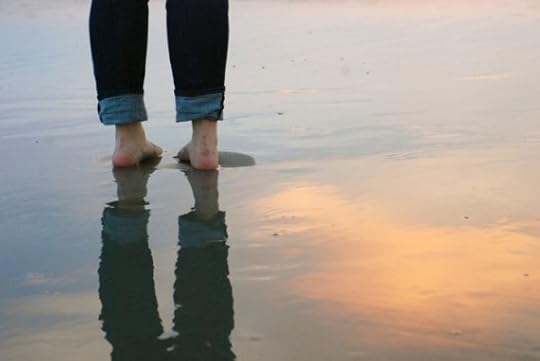
Photo credit: Emily Freeman
We search and strive for more and ultimately end up disappointed, because we’re searching in all the wrong places.
So how do we find the fullness of life and all it has to offer? How do we really live and not merely exist? We’ve got to get out of the bubble. We have to have our world turned upside-down.
I don’t know about you, but that’s the last thing I want but first thing I need.
Read the rest: The last thing we want could be the first thing we need

September 26, 2012
Why We All Need Journeys
I began my adult life as a traveler; in many ways, travel has made me who I am today. I think we all could learn to see our lives more as a journey than a destination. We would be better for it.
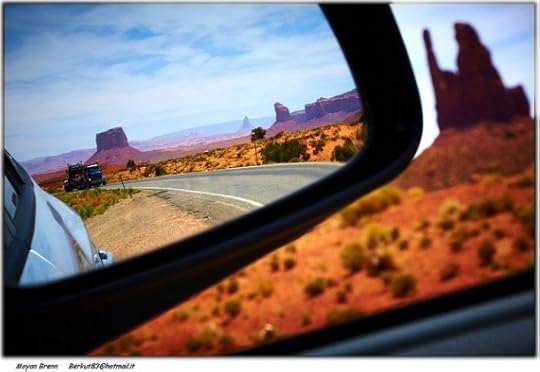
Photo credit: Moyan Brenn (Creative Commons)
For me, it started with a three-hour trip downstate to go to college. Then a semester in Spain. Then a couple summers in Texas.
After I graduated, I joined a band and traveled for a year: Canada, most of the U.S., and Taiwan (we were BIG in Asia).
Then I moved to Nashville and spent the first few months going on weekend road trips. After that, I would drive 20 minutes downtown to hang out with homeless people. Later, I would lead mission trips overseas once or twice a year.
Wherever I was, I would find a way to embark on some excursion, some mini pilgrimage. Because in the leaving, I found myself. In the going, I learned something about my identity.
Three lessons journeys teach us
Journeys define us. They are important markers of our lives. And they remind us that we are all travelers of some sort.
Journeys reveal our shortcomings. They show us we are not alone in this world. That there are other wanderers out there, in searching of truth and meaning in this great big, confusing universe.
Journeys teach us about life. Richard Rohr said we go on journeys so we never have to go again. I sort of agree. We spend a semester abroad, take a year to backpack Europe, or volunteer with the Peace Corps to remember that life is the grand adventure. Once we learn this, we never stop traveling (even if we never leave home).
A journey is what you make it
It’s a process of leaving and arriving, of losing yourself and finding it again. And if these are our only criteria, anything can be a journey — as long as you are intentional.
Every once in awhile, I have to remind myself that despite a mortgage and steady job and any other semblance of stability, I am still a wanderer. Still a journeyman in search of answers, still a pilgrim in a foreign land.
And every so often, I have to take a trip to remember this. To find. To lose. To become. Last year, it was Ireland with my wife. Before that, Puerto Rico with a good friend. In the near future, it will be somewhere else.
The lesson of all journeys is this: Life is not stable, and we’re not in control. All we can do is enjoy the ride. (Click to tweet.) So how about it?
Twenty years from now you will be more disappointed by the things that you didn’t do than by the ones you did do. So throw off the bowlines. Sail away from the safe harbor. Catch the trade winds in your sails. Explore. Dream. Discover.
—Mark Twain
When was the last time you took a journey? What did you learn? Share in the comments.
Note: If this topic resonates with you, check out Seth Barnes’s new book, Kingdom Journeys . I helped him edit and publish it. Oh, and it’s FREE this week on Amazon (offer good through Sep. 29, 2012).

September 24, 2012
How to Be What You Do: Beyond the To Do List Interview
Download: Episode_006_-_Jeff_Goins.mp3
Erik Fisher has a great podcast called “Beyond the To Do List,” and he recently interviewed me for it. I’m a fan of well-done podcasts, and this is one you’re going to want to take note of.
In this episode, we talk about:
How I “turned pro” as a writer
What it takes to find your calling
The importance of practicing in public
Why you’re probably already that thing you want to be
Slowing down instead of speeding up
Making commitments
And more!
You can listen to the interview by clicking the player up above (go here if you can’t see an audio player in RSS or email).
Also, Erik’s show notes from our talk are available here (plus some links to killer resources).
Make sure you subscribe to the podcast (it’s free).
By the way, I’d love to hear your thoughts on this matter raised in the interview: We are more than what we do, but we also become what we practice. In other words, we play some part in our own destiny.
What do you think is the relationship between identity and action? Share in the comments.

September 22, 2012
Interview with Jon Acuff: How to Be a Quitter
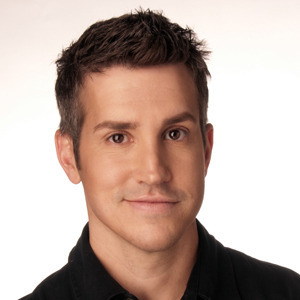 I had the opportunity to interview Jon Acuff, popular blogger, author and speaker. It was an inspiring and motivating conversation, and I wanted to share it with you.
I had the opportunity to interview Jon Acuff, popular blogger, author and speaker. It was an inspiring and motivating conversation, and I wanted to share it with you.
Jon’s book Quitter: Closing the Gap Between Your Day Job and Dream Job is relevant and timely. In it, he shares his own journey of how he went from cubicle-dweller to full-time author, speaker, and blogger.
My interview with Jon Acuff
Below is the full audio of our twenty-minute interview, as well as a transcript of some of my favorite questions and answers. If you can’t view the interview in your email or RSS reader, click here.
Caveat: The audio quality on this is not great. I recorded it for my own reference (not to air on a podcast or anything), but then decided to share it here. The clicking noise in the background is me typing notes.
Download: Jon%20Acuff%20Interview.mp3
[Click here to download the mp3.]
Jeff: Jon, your new book is about finding your dream. Does everybody have a dream? Are people afraid to name their dreams?
Jon: I think everyone does have a dream — in the sense that we’ve all been uniquely created with something that’s true of us and not true of anyone else…
I think that a lot of times people need permission to dream, because for a variety of reasons they’ve been told that they can’t.”
Jeff: Is there a re-emergence of dreaming in our culture?
Jon: I think so.
There is this sense of great expectation for us — of what’s possible… Where it’s corrupted is where it leads to entitlement.
What I’ve seen is that we all can bump into something that love doing, but if we don’t nurture that, and seed that and grow that, we often become entitled.
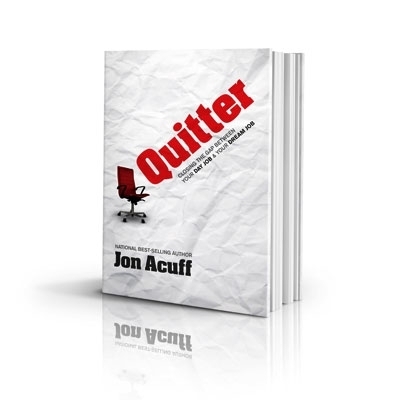 Jeff: What are some signs that it’s time to quit your day job and begin to step into your dream job?
Jeff: What are some signs that it’s time to quit your day job and begin to step into your dream job?
Jon: Part of the challenge is people go, ‘I gotta find my perfect job.” And there’s no such thing as a perfect job. There’s no such thing as a job where you only do the things you love 100% of the day. That doesn’t exist.
Looking for a perfect job often blinds you from finding your dream job.
So what we did is create an opportunity filter. For us that looked like saying,
I want to work somewhere where somebody has built a personal brand successfully and humbly.
I want to work somewhere in the Southeast.
I don’t feel called to a church.
I want to work somewhere where faith is part of the culture.
So as we started to build this opportunity filter, what it did was that when the Dave Ramsey opportunity came along, we could plug that in. And another opportunity at the same exact time came along, but when we plugged it into the opportunity filter, it didn’t meet as many of our criteria.
That’s one of the signs when you know you need to go — when you design an opportunity filter, and it’ll range from specific to very loose.
Jeff: Have you “arrived” at your dream?
Jon: No. There’s new opportunity and new challenges. The things you get to do change, but you still have to wrestle with fears and hope.
I don’t feel “done.” I feel like I’ve found a dream job. But now I get to perform in that job.
The voice that tells you, ‘Who are you to do that?’ doesn’t disappear when you get to your dream job. If anything, it gets louder, because it’s frustrated that you’re there.
You only hear voices of doubt like that when you actually start to do things that you’re called to do. If you’re living a flat, common life where you don’t take risks — where you don’t live out of your heart — you won’t get bothered by those voices that much.
Jeff: What’s some practical advice for someone who wants to be a writer and speaker (like you)?
Jon: A big part of it is practice.
People will send me questions like, ‘How do I get paid to do my dream?’ That’s a great question eventually, but the first question is, ‘How do I get great at my dream?’
How do I do 100 speeches for free before I get paid for one? How do I write 500,000 words on a blog before I get to write a book?
That, to me, is the hard work… the willingness to do that.
Jeff: What’s the balance between getting a clear confirmation of your dream and just hustling?
Jon: It is a balance. You need to do the thing that — if you didn’t do [it] — would be killing you. There’s definitely confirmation, but for me… the biggest thing is being obedient to that thing I have inside me that I feel that God has given me.
I’m going to write, because that’s what writers do. I’m going to speak, because that’s what speakers do. If you allow feedback from other people to be the thing that eventually drives you, when they stop giving it to you, they essentially tell you to stop dreaming.
That’s a really powerful control to put into somebody else’s hands.
Get the full interview
The above is just the “best of” from my interview with Jon. We also talked about:
What’s next for Jon
How he found his dream
His 18-month quitting process
Working through issues of entitlement to nurture your dream
Dealing with positive and negative feedback
If you enjoyed reading the transcript, check out the full audio interview. It’s full of a lot more content and definitely worth the listen (despite my cracking voice, random typing, and a cough or two).
Become a quitter
If these ideas resonate with you, you should probably check out Jon’s book, Quitter, which I recommend. You can get it on Amazon (affiliate link).
Also, keep an eye out for the next Quitter Conference. It’s a great event that is encouraging lots of people to take the jump into their dreams.
What are you doing to close the gap between your day job and dream job? Share your own “quitter” story in the comments.

September 20, 2012
The Power of Being Present in the Age of Urgency
I was in a movie once. Now, I’m famous. I even went to the premiere and brought my mom and best friend to watch. I felt pretty important — until my mom asked me to rewind the movie in the theater because the scene went by too fast.

Photo credit: Dave Stokes (Creative Commons)
I may have forgotten to mention I wasn’t the star. I didn’t even have a speaking part. I sat at the table with a complete stranger and was instructed to laugh when I heard the word “Action!”
After three takes, I got up and went home. I prepared myself for the agent to call and the deals to start rolling in. Six years later, I’m still waiting for the call.
My 15 minutes of fame was more like 10 seconds of, “I’m sorry, who are you?”
This doesn’t just apply to being an extra in a movie. This is the way the world works. We’re busy. We don’t have time to pay attention.
What are we busy doing?
In our urgent world, there are distractions everywhere. Between kids, marriages, and the incessant pull of Facebook, there is no shortage of things demanding our attention.
I want my life to be slower in a culture set on being faster. Here are just a few examples:
We use the microwave to cook our food more quickly, and stand at the counter to eat so we can move on to the next task.
We drive faster cars.
We get 4G because 3G just doesn’t do the trick anymore.
We multitask because, after all, we’ll be more productive that way… right?
And we can’t tell the difference between Starbucks and Folgers, because apparently we don’t “slow down to smell the coffee.” Or is it “smell the roses?” I’m too busy to remember.
Life is moving, but are we living?
I have a friend named Sandy whose cell phone is from ancient times. She doesn’t text, and social media is a foreign language to her. I think she’s crazy, really.
I often want to shake my friend and yell, “Welcome to the 21st Century, lady. Get with the program!” But then I look at her and see peace. She just is.
Sandy can sit in silence for hours. After about two minutes, my legs are shaking and I’m twiddling my thumbs, anxious for something to fill the awkward gap. I envy her that.
Don’t get me wrong. Social media isn’t all bad. It’s how I put food on the table. But it can quickly become a distraction when my priorities aren’t in line.
If I’m not careful, I’ll use texting and instant messaging as my default relationship-builders. But that’s not a life; it’s a fabricated existence.
And what I really want is to make it to the four-minute mark while practicing stillness without going mad. So I’d better get back to the heart of it all.
What really matters
I don’t remember the name of that movie I was in. But I do remember standing in a circle and praying with a group of people who had lost their homes from the devastation of Hurricane Katrina that same year.
I’ve lost count of the how many photos I’ve seen on Facebook of kids with chocolate-smeared faces. But I remember the friends and family mourning the drowning of a young man down the road.
It’s those things that tug at our hearts we will remember most. It’s the tears we’ve shed with family. It’s the all night conversations we have with friends we see once every three years.
Here’s what I’m trying to say: I want my priorities back in line.
Day by day, I’m learning to re-prioritize. I’m making efforts to talk on the phone more versus texting. I’m closing the laptop when I’m finished with a project instead of staring into cyberspace. I’m allowing myself to be more vulnerable in my relationships. I’m choosing to live.
I’m not where I need to be, but I’m not where I used to be, either. Thank God. I want the word “busyness” out of my vocabulary. I want to be available. Focused. Present.
Don’t you?
What priorities do you need to realign today? Are you living or just busy? Share in the comments.

September 18, 2012
“Doesn’t Hurt to Ask…”
Of course, it does. What a stupid thing to say. It can hurt a LOT to ask. If you do it:
in the wrong way
at the wrong time
with the wrong person
Whoever said it doesn’t hurt to ask has never been turned down for a date. They’ve never made an offer someone could refuse. So if this is you, let me tell you: it hurts to ask.
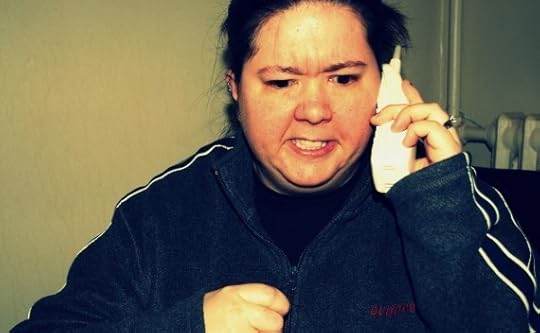
Photo credit: Morgan (Creative Commons)
That’s what makes asking so scary and so risky. There is something we can lose: our honor, our self-respect, even relationship with that person. It’s supposed to hurt to ask; that’s what makes permission so valuable.
Okay, so what does this mean for us bloggers and artists and entrepreneurs? A few things:
Learn to ask in the right way. In other words, get permission. If want to sell digital products, ask people first to subscribe to your email list. Start a conversation before you start pitching. Get people to download a free mp3 sampler before you ask them to buy the whole album. This is about attention. Don’t demand or expect it; earn it.
Discern the right and wrong times to ask. In other words, use your brain. Pay attention. Are you making people comfortable? Are you affirming their struggles? Build a relationship before you start asking for things. Treat every meeting, every phone call, every email as an opportunity. And don’t take a single one for granted.
Don’t ask the wrong person. Who is that, you say? I’ll tell you who: a perfect stranger. We don’t pay attention to people we don’t know or trust. Invest in the relationship, and save the asking for later. Sometimes you only have to wait an hour, but the reward is worth it (like selling a product after you speak at a conference, for example). You know you’re asking the right people and when they’re coming to you.
This isn’t about selling products or getting published, by the way. It’s about people and how we’re all wired. Everything comes down to trust. Whether you’re a plumber or a painter or somebody who works in a cubicle, you have to get people to trust you.
So how do we do this without becoming sleazy, multi-level marketers? Easy. Do what all humans do: build a relationship. Use every interaction to give someone (i.e. a customer, a friend, a fan) another reason to believe you, to want to listen.
Do that — and never violate the understood permission it entails — and you’ll be set.
And if that doesn’t work, spend time helping someone and then don’t ask for anything in return. Serve your way into influence. When the moment is right, you can ask. But maybe then, you won’t have to.
What do you think? Does it hurt to ask? What are some examples? Share in the comments.
You just finished reading "Doesn't Hurt to Ask..."! Consider leaving a comment!
Have you been WRECKED?

September 14, 2012
When a Story Really Begins
A story doesn’t begin with exposition. It doesn’t start when you see the title on the screen or when the main character arrives on the scene. A story begins with conflict.
Without conflict, you don’t have a story. You have a reality show. Go ahead and tweet that, I dare you. By the way, melodrama doesn’t count as conflict.
Until Darth Vader storms the ship or Dorothy gets swept up by the tornado, you don’t have a tale worth telling. It might entertaining or interesting, but it’s not a story.
It all comes down to a moment. When Harry Potter finds out he’s a wizard. When Katniss steps in to die for her sister. That’s when a story really begins — when things start to get uncomfortable. Everything else is just setup.
Screenwriters call this catalytic moment an “inciting incident.” It’s when things start to get interesting — when your tiny tale gets messed up by a larger story. And the same is true for life.
What causes a character to grow
We all change. To be molded and shaped into the people we’re supposed to be.
We know this is necessary in movies and novels and even sitcoms. It’s a good thing for a person to learn something by the end of the episode, to be a better version of themselves.
But when it comes to our lives, we forget this, don’t we? We think somehow it would be good to just stay the same.
So we run: away from costly commitments and hard things. And the tragedy is these are the very things that would change us and cause us to grow.
Then something happens…
This is the nature of story. Something unexpected has to occur. Someone has to be jolted in order for a tale to be set into motion.
I call this getting wrecked. You might call it something else. Regardless, there has to be a revelation of something more than a character’s little plans. That’s how heroes are made, even you.
We are both uncomfortable and excited by this idea — that we could be save the day. But isn’t this what life is teaching us, what God wants us to learn? That we have a part to play in a great epic? That there is brokenness to be healed and wrongs to be rights — and we hold the keys to fix it?
Perhaps the world is waiting for us to do just that.
What this means for the real world
This can come across sounding WAY intense, when in reality it can mean something very simple. G.K. Chesterton said an adventure is an inconvenience rightly considered. In other words, we find our roles in the story by stepping into discomfort.
This could mean a trip around the world or a walk around the block; it depends on your context. What it doesn’t mean is you stay sitting on the couch.
Your story begins when you take the initiative to be inconvenienced, to be changed. And of course, there’s always the option that if you don’t make that choice, it just might be made for your. So wouldn’t it be better to be a little proactive?
Where we go from here
I don’t know where you are in finding your role in the story, but if you need a little nudge, here are three choices you could make today:
Go somewhere uncomfortable. I don’t care if it’s inner-city Philly or the nice lady’s house next door.
Pay attention. We find our callings when we watch and listen to the world around us, especially when we find ourselves in a new place.
Do something different. Don’t respond to the situation how you normally would. A character changes when he does something he normally wouldn’t do.
Of course, this isn’t the official three-step process to finding your calling — there is no such process — but it’s a start. And for many of us, that’s enough.
It’s a dangerous business going out your front door.
—J.R.R. Tolkien
Have you found your role in life’s story? What great conflicts have you had to face? Share in the comments.
If you’re interested in this sort of thing, check out the book, Inciting Incidents. It’s a collection of real-life stories, and I had the privilege of contributing one of mine as the first chapter. You can also hear a special radio program in which I do an exclusive interview, along with some other cool people, here.
You just finished reading When a Story Really Begins! Consider leaving a comment!
Have you been WRECKED?


